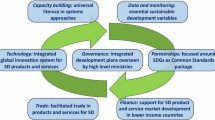Abstract
Joint Implementation (JI) under the Framework Convention on Climate Change means that countries could partly offset their national abatement commitments by investing in CO2 abatement projects abroad. JI is introduced as a mechanism for achieving a certain global abatement target less costly by separating the commitments from the implementation of measures. This paper studies the design of a JI contract when the investor has incomplete information about the foreign firm which carries out the JI project (the host). Asymmetric information leads to a decrease in the potential cost savings from JI. Furthermore, private information held by the potential host firm could give the firm a significant positive utility of participating in JI projects. The possibility of being a host for a JI project in the future can prevent potential host firms from investing in profitable abatement projects today. The paper analyzes the impact on emissions of CO2 of strategic behavior among potential hosts for JI projects.
Similar content being viewed by others
References
Barrett, S. (1992), ‘Reaching a CO2-Emission Limitation Agreement for the Community: Implications for Equity and Cost-Effectiveness’, European Economy, 3–24.
Barrett, S. (1993a), ‘Joint Implementation for Achieving National Abatement Commitments in the Framework Convention on Climate Change’, OECD, Group on Economic and Environment Policy Integration, Mimeo, Paris.
Barrett, S. (1993b), ‘A Strategic analysis of “Joint Implementation” Mechanisms in the Framework Convention on Climate Change”, Paper to the United Nations Conference on Trade and Development in Geneva, London Business School and Centre for Social and Economic Research on the Global Environment, London.
Burniaux, J.-M., J. P. Martin, G. Nicoletti and J. O. Martins (1992), ‘The Cost of Reducing CO2 Emission: Evidence from GREEN’, Economics Department Working Paper 115, OECD.
Bohm, P. (1994), ‘On the Feasibility of Joint Implementation of Carbon Emission Reductions’, Research Papers in Economics 2, Department of Economics, University of Stockholm.
Hanisch, T. (1991), ‘Joint Implementation of Commitments to Curb Climate Change’, CICERO Policy Note No. 2, University of Oslo.
Laffont, J-J. and J. Tirole (1993), A Theory of Incentives in Procurement and Regulation, The MIT Press.
Mintzer, I. (1994), ‘Institutional Options and Operational Challenges in the Management of a Joint Implementation Regime’, in K. Ramakrishna, ed., Criteria for Joint Implementation under the Framework Convention on Climate Change, Woods Hole, MA.: Woods Hole Research Center.
Oliveira-Martins, J., J-M. Burniaux and J. P. Martin (1992), ‘Trade and the Effectiveness of Unilateral CO2-abatement Policies: Evidence From GREEN’, OECD Economic Studies 19, 123–40.
Selrod, R. and A. Torvanger (1994), ‘What Might be Minimum Requirements for Making the Mechanism of Joint Implementation under the Climate Convention Credible and Operational’, in Prodipto, Ghosh and Jyotsna, Puri, eds., Joint Implementation of Climate Change Commitments-Opportunities and Apprehensions, New Delhi: Tata Energy Research Institute and Oslo: CICERO Report No. 4.
Torvanger, A., J. S. Fuglestvedt, C. Hagem, L. Ringius, R. Selrod and H. A. Aaheim (1994), ‘Joint Implementation Under the Climate Convention: Phases, Options and Incentives’, CICERO Report No. 6, University of Oslo.
Pezzey, J. (1992), ‘Analysis of Unilateral CO2 Control in the European Community and OECD’, The Energy Journal 13, 159–172.
Whalley, J. and R. Wigle (1991), ‘The International Incidence of Carbon Taxes’, in R. Dornbusch and J. M. Poterba, eds., Global Warning: Economic Policy Responses, MIT Press.
Author information
Authors and Affiliations
Rights and permissions
About this article
Cite this article
Hagem, C. Joint implementation under asymmetric information and strategic behavior. Environmental and Resource Economics 8, 431–447 (1996). https://doi.org/10.1007/BF00357412
Received:
Issue Date:
DOI: https://doi.org/10.1007/BF00357412




